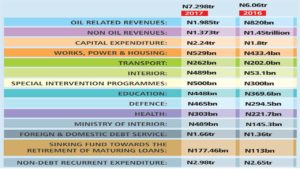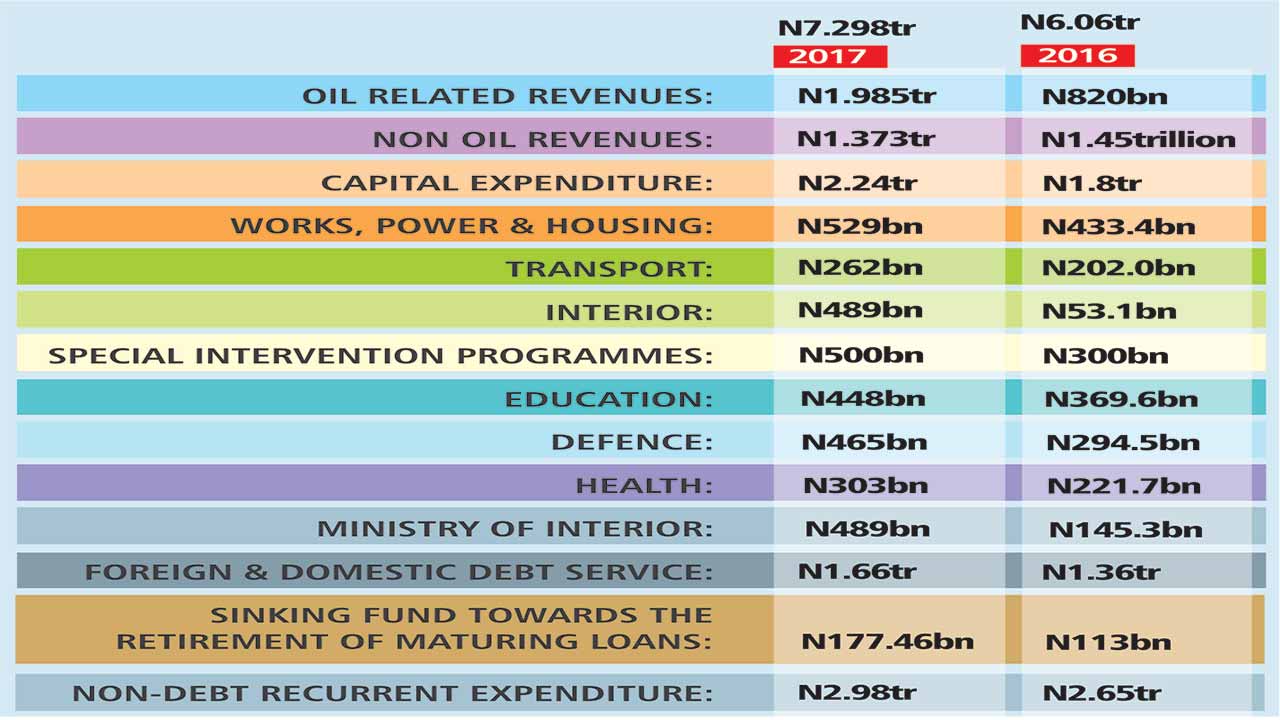 • Power, transport top Buhari’s N7.3 trillion budget
• Power, transport top Buhari’s N7.3 trillion budget
• Security agents lock out workers, journalists, lawmakers
• Govt to borrow N2.32tr, unveils plans for job creation
The Federal Government will spend huge part of next year’s national revenue to service debts, pay salaries and run the everyday business of governance. This was contained in President Muhammadu Buhari’s budget speech presented to the Senate yesterday.
Spending so much of the appropriated N7.289 trillion on lifestyles — salaries and debt servicing — will threaten the country’s plan to spend its way out of recession amid dwindling revenue in the coming year. Low investment in infrastructure and agriculture as a result of leaner appropriation for Health, Agriculture and Defence will undermine government’s efforts at job creation and fight against insurgency and graft.
Government plans to spend N1.837 trillion (about 25.2 per cent of the total budget estimate) for debt-servicing and about 66 per cent (amounting to N4.81 trillion) as total recurrent expenditure next year. Money need to build physical infrastructure is put at N2.24 trillion, about 30.7 per cent of the budget estimate.
High expenditure on debt servicing — more than N600 billion above the 2016 figures — is coming at a time government is planning to borrow additional $30 billion to beef up the national debt stock. It means that 2017 could be tougher as government will have to borrow and struggle more to meet infrastructure needs and provide jobs to stave off recession.
On the whole, Power, Transport, Prisons and paramilitary agencies are to gulp larger chunk of budgeted funds, which indicates the President’s priorities in the coming year.
The Senate has already said it would ensure early release of the budget timetable just as a section of the House of Representatives yesterday expressed reservations over the estimates, saying that 2.2 million barrels of daily oil production was not realistic.
President of the Senate,
Prior to Buhari’s presentation of the Appropriation Bill yesterday, the Management of the National Assembly had suspended activities by asking staff to steer clear of the premises. Security operatives barred all entrances leading to the complex as they stopped journalists and some lawmakers from entering the legislative complex.
As early as 5.30 a.m., a combined team of Police and the Sergeant-at-arms had already locked all the three entrances to the federal parliament, denying both journalists who were duly accredited to cover the budget presentation and the lawmakers entrance.
There was, however, a misunderstanding between the Police and the National Assembly’s Sergeant-at-Arms when the two security agencies received conflicting directives from the management.
The Guardian observed that most of the banks and restaurants inside the complex were closed as no officials of the banks were seen attending to customers.
It was also observed that the NASS car park directly opposite the Presidential Villa gate was cordoned off by security operatives ahead of the President’s arrival.
The highest recurrent expenditure allocation of N482.37 billion goes to the Ministry of Interior as President Buhari presented a total budget estimate of N7.298 trillion to the National Assembly, based on a benchmark crude oil price of $42.5 per barrel; an oil production estimate of 2.2 million barrels per day; and an average exchange rate of N305 to the US dollar. The budget document, according to the President, was built on expected aggregate revenue of N4.94 trillion of which oil is projected to contribute N1.985 trillion.
The President stated that 30.7 per cent of the budget, which represents N2.24 trillion, is voted for capital expenditure while recurrent expenditure takes N2.98 trillion.
The 2017 budget estimate is nominally 20.4 per cent bigger than the 2016 estimates. Capital expenditure will be 30.7 per cent “in line with our determination to reflate and pull the economy out of recession as quickly as possible,” the President said.
“This fiscal plan will result in a deficit of N2.36 trillion for 2017, about 2.18 per cent of GDP. The deficit will be financed mainly by borrowing, which is projected to be about N2.32 trillion. Our intention is to source N1.067 trillion or about 46 per cent of this borrowing from external sources while, N1.254 trillion will be borrowed from the domestic market,” Buhari explained.
He stated that the proposed aggregate expenditure of N7.298 trillion would comprise statutory transfers of N419.02 billion; Debt service of N1.66 trillion; Sinking fund of N177.46 billion to retire certain maturing bonds; Non-debt recurrent expenditure of N2.98 trillion; and Capital expenditure of N2.24 trillion (including capital in Statutory Transfers).
On recurrent expenditure, the President said that a significant portion of recurrent expenditure has been provided for payment of salaries and overheads in institutions that provide critical public services.
Breakdown of recurrent expenditure shows that the sum of N482.37 billion is voted for the Ministry of Interior; N398.01 billion for Ministry of Education; N325.87 billion for Ministry of Defence; and N252.87 billion for Ministry of Health.
He told the National Assembly that the sum of N1.8 trillion has been provided for personnel costs just as he stated, “it is important that we complete the work that we have started of ensuring the elimination of all ghost workers from the payroll.”
And the breakdown of the capital aspect of the budget include provision of N529 trillion for Power, Works and Housing sector; N262 trillion for Transportation.
Others are Special Intervention Programmes, which gulps N150 billion; Defence, which got N140 billion; Water Resources that has N85 billion; and Industry, Trade and Investment, which takes N81 billion.
Interior ministry gets N63 billion; Education takes N50 billion while Universal Basic Education Commission got N92 billion.
Other details of the capital expenditure are Health sector, which gets N51 billion; Federal Capital Territory that takes N37 billion; Niger Delta Ministry which has allocation of N33 billion; and Niger Delta Development Commission with N61 billion.”
Buhari stated that N100 billion has been provided in the Special Intervention programme as seed money into the N1 trillion Family Homes Fund that will underpin a new social housing programme. This substantial expenditure is expected to stimulate construction activity throughout the country.
The Non-oil revenues, according to him, largely comprises Companies Income Tax, Value Added Tax, Customs and Excise duties, and Federation Account levies which are estimated to contribute N1.373 trillion.
“We have set a more realistic projection of N807.57 billion for Independent Revenues, while we have projected receipts of N565.1 billion from various Recoveries. Other revenue sources, including mining, amount to N210.9 billion,” the President added.
“Efforts to fast-track the modernization of our railway system will receive further boost through the allocation of N213.14 billion as counterpart funding for the Lagos-Kano, Calabar-Lagos, Ajaokuta-Itakpe-Warri railway, and Kaduna-Abuja railway projects.
“As I mentioned earlier, in 2016, we invested a lot of time ensuring the paper work is done properly while negotiating the best deal for Nigeria. I must admit this took longer than expected but I am optimistic that these projects will commence in 2017 for all to see.”
Buhari further explained that, “Given the emphasis placed on industrialisation and supporting SMEs, a sum of N50 billion has been set aside as Federal Government’s contribution for expansion of existing, as well as the development of new, Export Processing and Special Economic Zones.
“These will be developed in partnership with the private sector as we continue our efforts to promote and protect Nigerian businesses. Furthermore, as the benefits of agriculture and mining are starting to become visible, I have instructed that the Export Expansion Grant be revived in the form of tax credits to companies. This will further enhance the development of some agriculture and mining sector thereby bringing in more investments and creating more jobs.
“The sum of N20 billion has been voted for the revival of this programme,” he added.
On small-scale industries, the President said:
“Our small- and medium-scale businesses continue to face difficulties in accessing longer term and more affordable credit. To address this situation, a sum of N15 billion has been provided for recapitalisation of the Bank of Industry and the Bank of Agriculture. In addition, the Development Bank of Nigeria will soon start operations with US$1.3 billion focused exclusively on Small and Medium-Sized Enterprises
“Agriculture remains at the heart of our efforts to diversify the economy and the proposed allocation to the sector this year is at a historic high of N92 billion. This sum will complement the existing efforts by the Federal Ministry of Agriculture and CBN to boost agricultural productivity through increased intervention funding at single-digit interest rate under the Anchor Borrowers Programme, commercial agricultural credit scheme and the Nigeria Incentive-based risk-sharing system for agricultural lending.
“Accordingly, our agriculture policy will focus on the integrated development of the sector by facilitating access to inputs, improving market access, providing equipment and storage as well as supporting the development of commodity exchanges.







